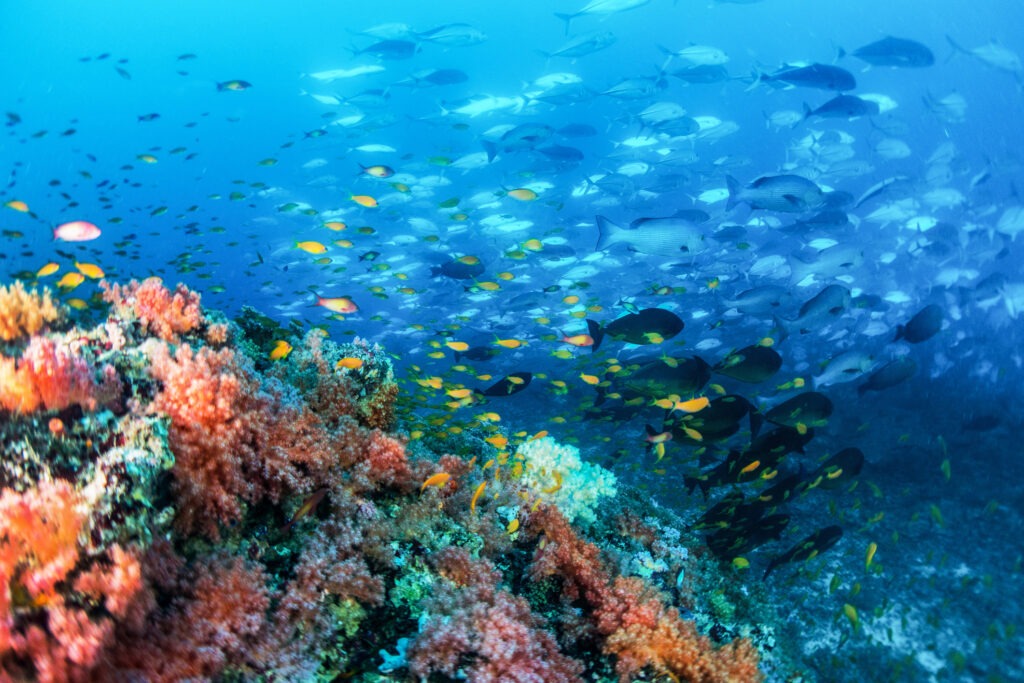China’s Approach to Ocean Governance: Multilateralism Based Policy and Practice
International Seabed Authority Headquarters
Photo Credit: James A.R. McFarlane
- Maritime Studies
- Asia-Pacific, China
Much of the Earth’s riches are to be found in and under its oceans. Ocean governance is an issue area in which China has been actively experimenting with various thoughtful initiatives to overcome unaddressed structural obstacles as China has advanced its participation and leadership in existing multilateral institutions.
China has exercised leadership by actively participating in enhanced global governance of the oceans and seas. Apart from active participation in relevant mechanisms under the United Nations Convention on the Law of the Sea (UNCLOS), China has also proposed the “21st Century Maritime Silk Road” initiative, which calls for maritime cooperation among States based on the principles of consultation, contribution and shared benefits in order to jointly address risks and challenges.
As a party to numerous ocean-related multilateral treaties, China is involved in several relevant mechanisms under UNCLOS and/or the UN framework and fully supports benefit-sharing undersea resources that are the common heritage of mankind. In addition to its participation in the Meeting of the States Parties to the UNCLOS and the Regular Process for Global Reporting and Assessment of the State of the Marine Environment, China has recently actively promoted the development of a “blue economy” envisioned by the General Assembly’s resolution on Sustainable Fisheries, and has supported the resolution on “Oceans and the Law of the Sea”.
The International Seabed Authority (ISA), which was established to manage the vast seabed resources by UNCLOS, aims to adopt seabed mineral exploitation rules this year. The Chinese government has been actively participating in the work of the formulation of the exploitation regulations of the deep-sea mineral resources and has submitted its constructive comments and proposals. It insists that the Exploitation Regulations should comply with the provisions and spirit of UNCLOS and the 1994 Implementing Agreement in a fair, comprehensive and complete manner. China fully believes that the Exploitation Regulations must strike a reasonable balance between the benefits of the common heritage of mankind, and the interests of sponsoring states and the contractors that they have sponsored.
The Chinese government actively participates and plays a constructive role in the negotiation of Intergovernmental Conference on Marine Biodiversity of Areas Beyond National Jurisdiction (BBNJ). China insists that the new international instrument should contravene neither current international law, nor existing global, regional or sectoral marine mechanisms. It holds the view that the new instrument should be consistent with the object and purpose of UNCLOS, while at the same time that it should not impair the integrity of UNCLOS and the delicate balance it contains.
Furthermore, China has actively advocated international cooperation and achieved fruitful outcomes in the fields of international shipping, marine scientific research, marine environmental protection, and maritime safety and security. It has carried out communication and cooperation programs with more than 50 countries on the blue economy, marine environmental protection, disaster prevention and reduction, and combating climate change. So far, China has signed more than 30 bilateral agreements in this regard. Meanwhile, China helps to construct domestic headquarters or branches for eight international maritime organizations, established the Chinese Government Maritime Scholarship and a variety of training programs, and trained thousands of maritime professionals for developing countries annually.
Geopolitically, China is an important party to a number of treaties in both polar regions. The 1925 Spitsbergen (Svalbard) Treaty, while also giving Norway full and absolute sovereignty over the Svalbard archipelago, grants the Treaty’s forty-six parties, including China, equal rights to undertake fishing, hunting, mining, trading, and industrial activities in the region. In January 2018, China’s State Council Information Office published a white paper titled “China’s Arctic Policy”. The white paper highlighted China’s policy goals in the Arctic, which are shaped by four key principles: understanding, protecting, developing and participating in the governance of the Arctic. China is also one of the ten signatory states of the International Agreement to Prevent Unregulated High Seas Fisheries in the Central Arctic Ocean, under which parties agree to prevent commercial fishing in the high sea area of the Arctic for an initial period of 16 years, subject to further extension.
At the other pole, the Antarctic Treaty and its numerous related agreements, known collectively as the Antarctic Treaty System (ATS), regulate international relations with respect to Antarctica, our planet’s only continent without a native human population. The treaty sets aside Antarctica as a scientific preserve, establishes freedom of scientific investigation, and bars military activity on the continent. China has been a member since 1983 and gained consultative status two years later because China demonstrated interest in Antarctica by “conducting substantial scientific research activity there” and consequently is entitled to participate in the treaty’s consultative meetings.
The Protocol on Environmental Protection to the Antarctic Treaty, also known as the Antarctic-Environmental Protocol, provides for comprehensive protection of the Antarctic environment and dependent and associated ecosystems. China has been a member since 1998.
Of special interest is the Convention on the Conservation of Antarctic Marine Living Resources (CCAMLR) of which China is a member, that aims to preserve marine life and environmental integrity in and near Antarctica by limiting caches of the small crustaceans called krill which are near the bottom of the food chain and whose population depletion in the Southern Ocean could seriously impact other marine life above krill in the food chain.
In addition, as a party to both the Safety of Life at Sea treaty and the International Convention for the Prevention of Pollution from Ships, China is also bound by the International Maritime Organization’s International Code for Ships Operating in Polar Waters, a mandatory code that entered into force in 2017 under both treaties, which “provide for safe ship operation and the protection of the polar environment by addressing risks present in polar waters”.
Closer to home, given the complexity of the South China Sea territory and maritime disputes and the difficulties of dispute resolution, China’s policy on the South China Sea has evolved from upholding only bilateral negotiation to multilateralism. Created in 1994, the ASEAN-China Dialogue marked the first time that China consented to multilateral negotiations. In November 2002, China and the 10 member ASEAN signed the non-binding Declaration of the Conduct (DoC) of Parties in the South China Sea, creating a political foundation for future possible commercial cooperation between China and ASEAN countries as well as for the long-term peace and stability in the region.
In July 2011, China and the ASEAN members reached a consensus on implementing the DoC. It was agreed that they should bring consultations on the guidelines to an early conclusion, fully implement the DoC and enhance practical cooperation. China and ASEAN have been holding talks for years to evolve a Code of Conduct, a set of regional norms and rules in the South China Sea to avoid conflicts in the disputed waters. ASEAN and China have agreed to finalize the Code of Conduct by 2022. Even though this goal has encountered a number of hurdles, including the interference of states outside the region and differences arising from conflict of interests among the claimants, it will be mutually beneficial to all stakeholders in the South China Sea to practice multilateralism in order to promote and maintain long term peace and stability in this vital region.





Diverging Currents: U.S.–China Strategies on Deep Seabed Mining and the Future of Ocean Governance